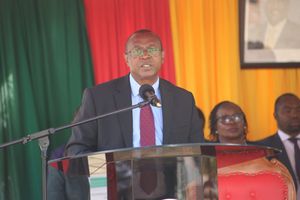Third new case of Ebola confirmed in east DR Congo

A member of the medical staff of the Ebola Treatment Unit (ETU) puts on her Personal Protective Equipment (PPE) during a weekly rehearsal at the Bwera General Hospital in Bwera bordering with DRC, western Uganda, on December 12, 2018.
Kinshasa,
A third new case of Ebola has been confirmed in North Kivu province of the Democratic Republic of Congo, a local health official said Friday.
The latest patient is a 22-year-old woman related the first case, who has died. She is being treated in Katwa treatment center, on the outskirts of Butembo, a city in North Kivu, said provincial health minister Eugene Nzanzu.
Sources with the World Health Organization said an additional team has been deployed on site in Butembo to support local efforts in contact tracing in preparation for vaccination.
Since the announcement of the first case last Sunday, nearly 200 contacts have been identified in the affected health areas.
The majority of those contacts are family members who accompanied the first two victims to hospital and later participated in unsafe burials, according to health authorities.
Samples taken from the first case are still being processed in the main laboratory of the National Institute for Biomedical Research of Kinshasa for genome sequencing in order to identify the Ebola strain and determine its link with the previous epidemic.
Authorities have to decide whether to declare the latest outbreak a new epidemic on the basis of the results of the genome sequencing.
The province of North Kivu was hard hit in the 10th epidemic, which lasted almost two years before being declared over last June, afflicting more than 3,460 people and killing 2,280 of them




